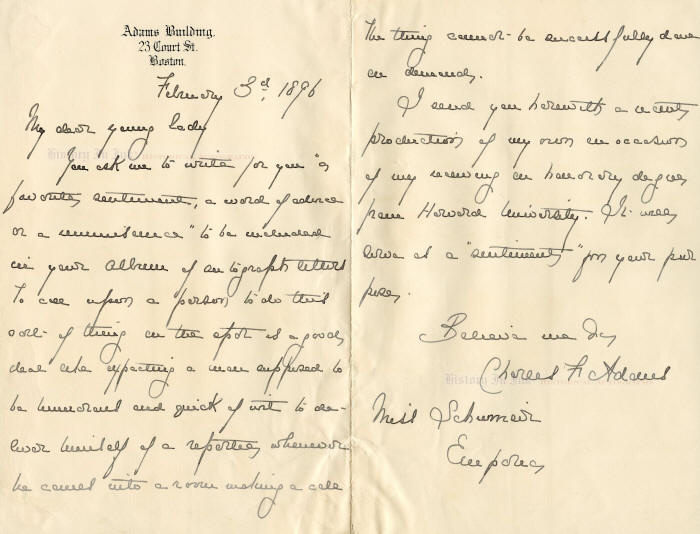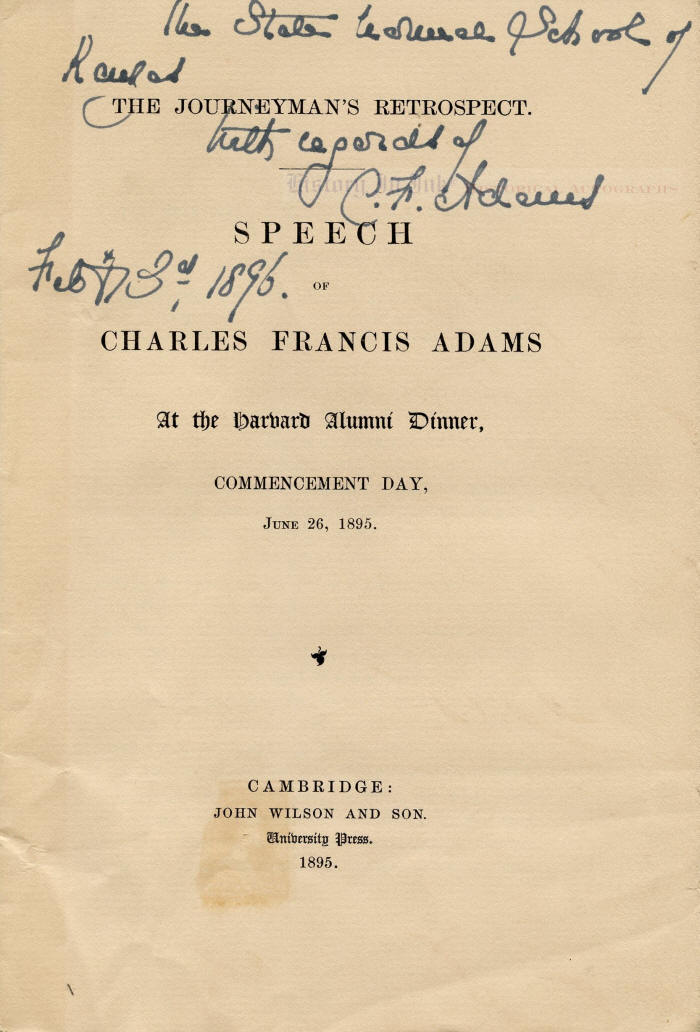


1007318
Charles Francis Adams II
Adams sends a signed copy of his extraordinary Harvard University speech
in which he recalled being “on the field of Gettysburg when the solid earth trembled
under the assault of that Confederate Virginian column" and hearing
"those cannon . . . booming in my ears, sounding the diapason
of that desperate onslaught"
Charles Francis Adams II, 1835–1915. Brevet Brigadier General, U.S. Volunteers; President, Union Pacific Railroad, 1884–1890; author of historical works. Autographed Letter Signed, Charles F. Adams, two pages, 5¼" x 8", with integral leaf attached, on stationery of the Adams Building, Boston, [Massachusetts], February 3, 1896. Accompanied by reprint of one of Adams's speeches, inscribed and signed C. F. Adams and by the address panel, in Adams's hand, clipped from the envelope.
Adams, a prominent member of the family that produced two American presidents, responds to a request from ”Miss Schumeir,” a student at the State Normal School at Emporia, Kansas, now Emporia State University, for a handwritten letter for albums to be devoted to the country's prominent men and women. Addressing her as ”My dear young lady,” he writes, in full: “You ask me to write for you ʻa favorite sentiment, a word of advice or a reminiscence' to be included in your album of autograph letters. To call upon a person to do that sort of thing on the spot is a good deal like expecting a man supposed to be benevolent and quick of wit to deliver himself of a repartee, whenever he comes into a room making a call. The thing cannot be successfully done on demand. / I send you herewith a recent production of my own on occasion of my receiving an honorary degree from Harvard University. It will serve as a ʻsentiment' for your purposes. / Believe me scy . . . ."
Adams sends a reprint of an extraordinary speech that he delivered upon receipt of an honorary degree from Harvard. He spoke on commencement day, which was also the Harvard Alumni Day, June 26, 1895. He has inscribed and signed the speech ”the State Normal School of Kansas / with regards of / C. F. Adams / Feby 3d, 1896.”
In the speech, entitled The Journeyman's Retrospect, Adams discusses events that have occurred between his admission to Harvard, when his “apprenticeship . . . was about to begin,” and his honorary degree, which “signifies that the days of my travels,—my Wanderjahre,—as well as my apprenticeship, are over, and that the journeyman is at length admitted to the circle of Master-workmen." Of particular significance was his experience in battle at Gettysburg during the Civil War. By the time of Gettysburg, Adams was a captain in the 1st Massachusetts Cavalry. He spoke of the earth trembling from the assault of Robert E. Lee's Virginians:
[W]hen, in 1853, . . . I, the coming apprentice, ascended those steps [of University Hall], "the cobweb woven across the cannon's mouth" still shook "its threaded tears in the wind." Eight years later the cobweb was swept away; and though, as the names graven on the tablets at the entrance of this hall bear witness, "many were crushed in the clash of jarring claims," yet we too felt the heart of a people beat with one desire, and witnessed the sudden making of splendid names. . . . I had read of battles and "the imminent deadly breach;" but it was given to me to stand on the field of Gettysburg when the solid earth trembled under the assault of that Confederate Virginian column, then performing a feat of arms than which I verily believe none of all recorded warfare was ever more persistent, more deadly or more heroic.
Adams went on to survey other events. He spoke of Charles Darwin's theory of evolution and David Livingstone's discovery of the source of the Nile River: “In our own time and before our purblind eyes,” he said, “scarcely realizing what they saw or knowing enough to wonder, Livingstone eclipsed Columbus, and Darwin rewrote Genesis." In conclusion, he returned to Gettysburg:
More than thirty years ago, while those cannon of Gettysburg were booming in my ears, sounding the diapason of that desperate onslaught . . . , there came up in my memory these lines from the Samson Agonistes:—
"All is best, though we oft doubt,
What th' unsearchable dispose
Of highest wisdom brings about
And ever best found in the close.
Oft he seems to hide his face,
But unexpectedly returns,
And to his faithful champion will in place
Bear witness gloriously."
These lines, I say, I repeated over and over to myself, somewhat mechanically I suppose, in the dust and heat and crash of that July day. I was young then; I am young no longer. But, now as then, these verses from Milton's triumphant choral chant bring to me, clad in seventeenth-century words and thought, the ideas of evolution, continuity, environment and progression, and, above and beyond all, abiding faith in man and in our mother age, which are the lamps the last half of the nineteenth century has lit whereby the steps of the twentieth century shall be guided.
After the Civil War, President Andrew Johnson nominated Adams for the rank of brevet brigadier general, with rank from March 13, 1865, "for distinguished gallantry and efficiency at the battles of Secessionville, South Carolina, and South Mountain and Antietam, Maryland and for meritorious services during the war." The United States Senate confirmed the award on July 23, 1866. Adams later served as president of the Union Pacific Railroad for six years, from 1884 to 1890. He also wrote a number of historical works, among which are
Adams's letter is in fine to very fine condition, and the speech and address panel are in fine condition. Adams wrote the letter on the front of the first leaf and the back of the integral leaf, so that both pages appear side by side when the letter is unfolded. It thus is quite displayable. The letter shows a bit of wrinkling, and there are mounting traces on the inside of the folded letter from prior mounting in the school album. The speech has some wrinkling and a small stain at the bottom, well away from the inscription and signature, and insignificant mounting traces on the blank back page. The irregularly trimmed address panel is soiled and slightly wrinkled.
Unframed.
_____________
This item has been sold, but
click here to see other
American History items
that we are offering.



